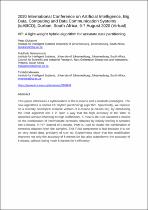JavaScript is disabled for your browser. Some features of this site may not work without it.
- ResearchSpace
- →
- Research Publications/Outputs
- →
- Conference Publications
- →
- View Item
| dc.contributor.author |
Olukanmi, P

|
|
| dc.contributor.author |
Nelwamondo, Fulufhelo V

|
|
| dc.contributor.author |
Marwala, T

|
|
| dc.date.accessioned | 2020-11-10T11:20:22Z | |
| dc.date.available | 2020-11-10T11:20:22Z | |
| dc.date.issued | 2020-08 | |
| dc.identifier.citation | Olukanmi, P., Nelwamondo, F.V. & Marwala, T. 2020. HP: A light-weight hybrid algorithm for accurate data partitioning. Presented in: 2020 International Conference on Artificial Intelligence, Big Data, Computing and Data Communication Systems (icABCD), Durban, South Africa, 6-7 August 2020 (Virtual) | en_US |
| dc.identifier.isbn | 978-1-7281-6770-1 | |
| dc.identifier.isbn | 978-1-7281-6769-5 | |
| dc.identifier.uri | https://ieeexplore.ieee.org/document/9183854 | |
| dc.identifier.uri | DOI: 10.1109/icABCD49160.2020.9183854 | |
| dc.identifier.uri | http://hdl.handle.net/10204/11669 | |
| dc.description | Presented in: 2020 International Conference on Artificial Intelligence, Big Data, Computing and Data Communication Systems (icABCD), Durban, South Africa, 6-7 August 2020 (Virtual). Due to copyright restrictions, the attached PDF file contains the abstract of the full-text item. For access to the full-text item, please consult the publisher's website. | en_US |
| dc.description.abstract | This paper introduces a hybridization of the k-means and k-medoids paradigms. The new algorithms is named HP (hybrid partitioning) algorithm. Specifically, we improve on a recently developed scalable version of k-means (k-means-lite), by introducing the PAM algorithm into it in such a way that the high accuracy of the latter is absorbed without inheriting its high inefficiency. K-means-lite runs standard k-means on the combination of intermediate centroids obtained by initially feeding n samples into k-means. In HP, instead of k-means, PAM is used to cluster the combination of centroids obtained from the samples. This PAM component is fast because it is run on very small data, precisely of size nk. Experiments show that this modification improves not only the accuracy of k-means-lite but also outperforms the accuracy of k-means, without losing much k-means-lite's efficiency. | en_US |
| dc.language.iso | en | en_US |
| dc.publisher | IEEE | en_US |
| dc.relation.ispartofseries | Workflow;23891 | |
| dc.subject | K-means | en_US |
| dc.subject | K-means-lite | en_US |
| dc.subject | K-medoids | en_US |
| dc.subject | Clustering | en_US |
| dc.subject | Partitioning Around Medoids | en_US |
| dc.subject | PAM | en_US |
| dc.title | HP: A light-weight hybrid algorithm for accurate data partitioning | en_US |
| dc.type | Conference Presentation | en_US |
| dc.identifier.apacitation | Olukanmi, P., Nelwamondo, F. V., & Marwala, T. (2020). HP: A light-weight hybrid algorithm for accurate data partitioning. IEEE. http://hdl.handle.net/10204/11669 | en_ZA |
| dc.identifier.chicagocitation | Olukanmi, P, Fulufhelo V Nelwamondo, and T Marwala. "HP: A light-weight hybrid algorithm for accurate data partitioning." (2020): http://hdl.handle.net/10204/11669 | en_ZA |
| dc.identifier.vancouvercitation | Olukanmi P, Nelwamondo FV, Marwala T, HP: A light-weight hybrid algorithm for accurate data partitioning; IEEE; 2020. http://hdl.handle.net/10204/11669 . | en_ZA |
| dc.identifier.ris | TY - Conference Presentation AU - Olukanmi, P AU - Nelwamondo, Fulufhelo V AU - Marwala, T AB - This paper introduces a hybridization of the k-means and k-medoids paradigms. The new algorithms is named HP (hybrid partitioning) algorithm. Specifically, we improve on a recently developed scalable version of k-means (k-means-lite), by introducing the PAM algorithm into it in such a way that the high accuracy of the latter is absorbed without inheriting its high inefficiency. K-means-lite runs standard k-means on the combination of intermediate centroids obtained by initially feeding n samples into k-means. In HP, instead of k-means, PAM is used to cluster the combination of centroids obtained from the samples. This PAM component is fast because it is run on very small data, precisely of size nk. Experiments show that this modification improves not only the accuracy of k-means-lite but also outperforms the accuracy of k-means, without losing much k-means-lite's efficiency. DA - 2020-08 DB - ResearchSpace DP - CSIR KW - K-means KW - K-means-lite KW - K-medoids KW - Clustering KW - Partitioning Around Medoids KW - PAM LK - https://researchspace.csir.co.za PY - 2020 SM - 978-1-7281-6770-1 SM - 978-1-7281-6769-5 T1 - HP: A light-weight hybrid algorithm for accurate data partitioning TI - HP: A light-weight hybrid algorithm for accurate data partitioning UR - http://hdl.handle.net/10204/11669 ER - | en_ZA |






